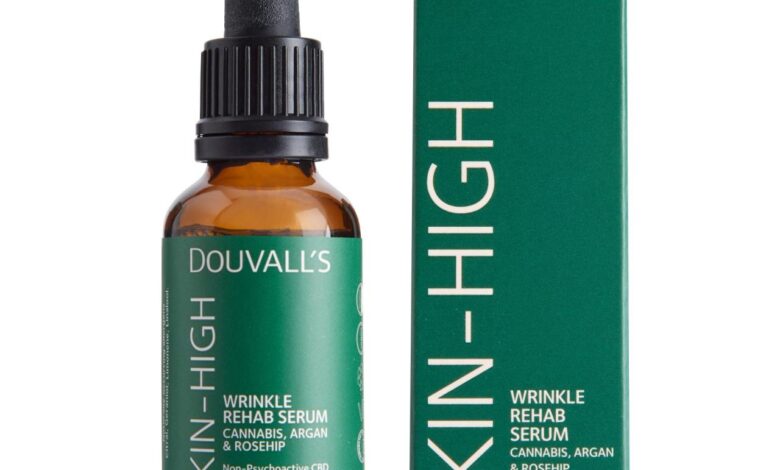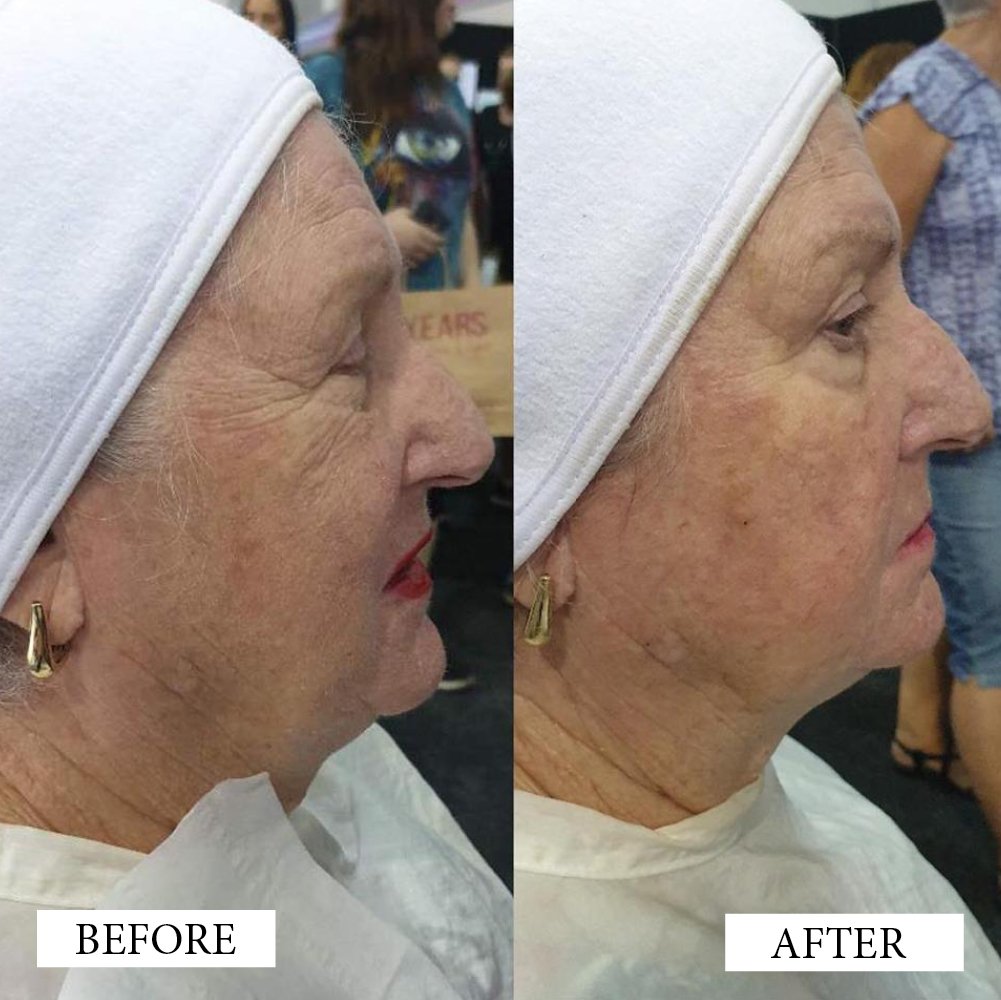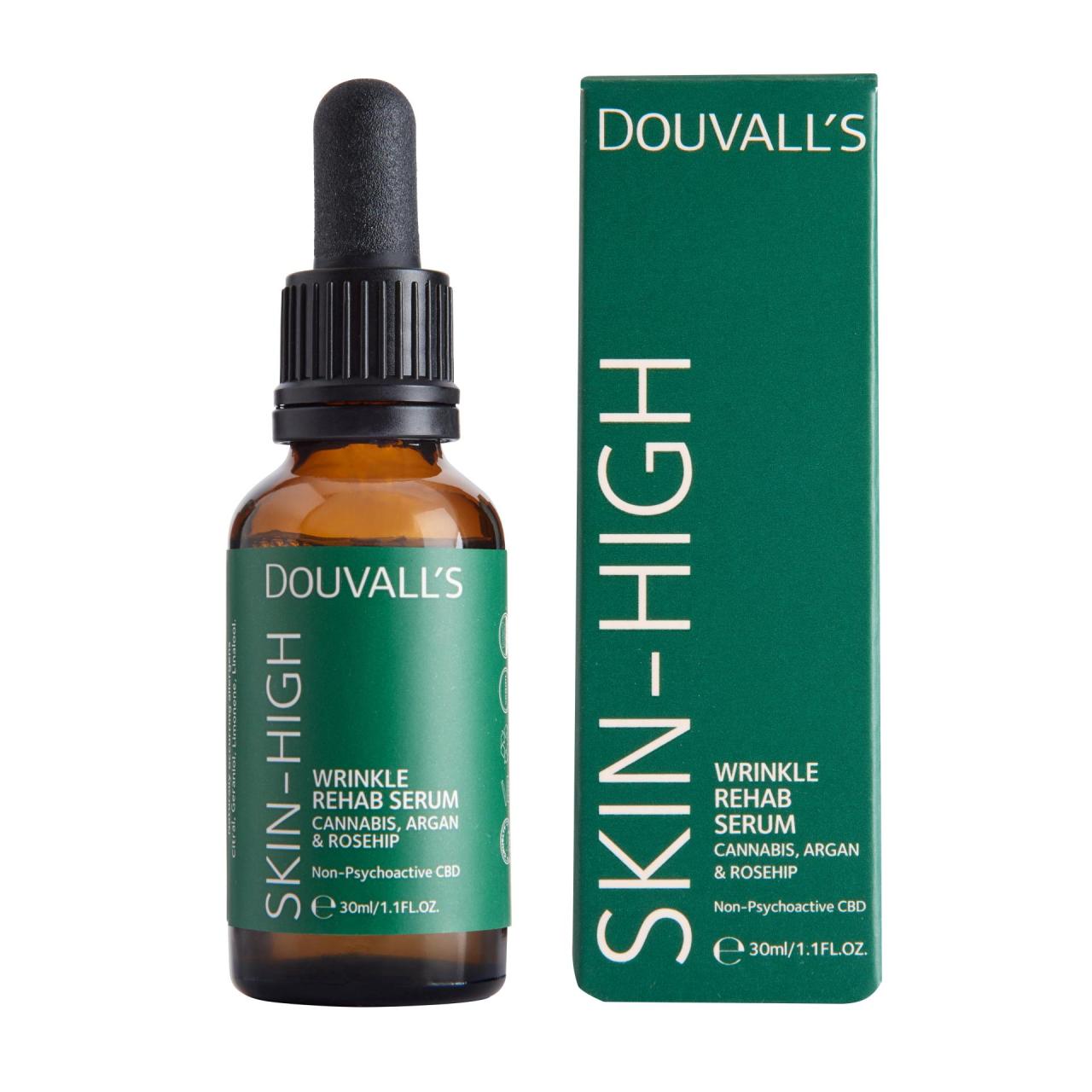
Best serum for wrinkles is a hot topic, and for good reason! Wrinkles are a natural part of aging, but there are effective ways to combat them, and the right serum can make a real difference. This comprehensive guide dives deep into the world of anti-aging serums, exploring everything from their ingredients to application tips, and helping you find the perfect product for your skin type and needs.
We’ll explore the science behind anti-wrinkle serums, examining common ingredients like retinol, hyaluronic acid, and peptides. We’ll also compare popular serums, looking at their unique formulations and potential benefits. Beyond the products themselves, we’ll touch on lifestyle factors, proper application, and potential side effects, ensuring you have a complete understanding of how to use these products effectively and safely.
Introduction to Anti-Wrinkle Serums
Anti-wrinkle serums have become a popular skincare choice for individuals seeking to address the visible signs of aging. These lightweight formulas, often containing potent ingredients, are designed to target various types of wrinkles, improving the overall appearance of the skin. Their targeted approach allows for a more concentrated delivery of active ingredients compared to moisturizers or creams, potentially leading to more noticeable results.These serums work by stimulating collagen production, hydrating the skin, and reducing inflammation.
Finding the best serum for wrinkles can be tricky, but it’s definitely worth the effort! Similar to how peptides can stimulate hair follicles for amazing growth, as detailed in this article on peptides for hair growth , certain peptide formulas can also be incredibly effective in plumping up skin and reducing the appearance of fine lines and wrinkles.
Ultimately, the best serum for wrinkles will depend on your individual skin type and needs. It’s all about finding the perfect match!
The effectiveness of these products often depends on the specific ingredients used and how well they are suited to the individual’s skin type and concerns. Understanding the different types of wrinkles and the mechanisms by which serums address them is crucial for making informed choices about skincare routines.
Common Ingredients and Their Benefits
Serums frequently incorporate a variety of ingredients, each with its purported benefits. Understanding these ingredients can help individuals select products that best meet their needs. Common ingredients include retinol, hyaluronic acid, peptides, vitamin C, and antioxidants.
- Retinol is a vitamin A derivative known for its ability to stimulate cell turnover, promoting collagen production and reducing the appearance of wrinkles. Its effectiveness is often attributed to its role in encouraging the skin’s natural renewal process. However, retinol can sometimes cause skin irritation or sensitivity, especially in those with sensitive skin.
- Hyaluronic Acid is a powerful humectant, meaning it attracts and retains moisture. This hydration helps to plump the skin, reducing the appearance of fine lines and wrinkles. Its ability to draw moisture from the air into the skin makes it a popular choice for all skin types. The potential for a slightly sticky or tacky feeling is a common side effect.
- Peptides are short chains of amino acids that stimulate collagen production and improve skin elasticity. These molecules can help to build and strengthen the skin’s structure, reducing the appearance of wrinkles and promoting a more youthful look. They are often more effective when used in conjunction with other ingredients.
- Vitamin C is a potent antioxidant that helps protect the skin from environmental damage. It can also stimulate collagen production and brighten the complexion, potentially reducing the appearance of wrinkles and other signs of aging.
- Antioxidants, such as Vitamin E, protect the skin from free radical damage. This damage is believed to contribute to the aging process. The addition of antioxidants can help to slow down the visible signs of aging and protect the skin from environmental stressors.
Types of Wrinkles and Serum Approaches
Wrinkles are categorized by their depth and appearance. Understanding the type of wrinkles present can help determine the most appropriate serum to address them.
- Fine lines are shallow creases in the skin that are often more noticeable with facial expressions. Serums containing humectants like hyaluronic acid and peptides can help to hydrate and plump the skin, minimizing the appearance of these lines.
- Deep wrinkles are more pronounced creases that extend deeper into the skin’s layers. Serums containing retinol, peptides, and antioxidants may be more effective in addressing deep wrinkles by stimulating collagen production and reducing inflammation.
Comparison of Serum Types
| Serum Type | Primary Benefit | Potential Drawbacks | Suitable Skin Type |
|---|---|---|---|
| Retinol | Cell turnover, collagen production | Skin irritation, sensitivity | Normal to oily skin |
| Hyaluronic Acid | Hydration, plumping | Potential for a sticky feeling | All skin types |
| Peptides | Collagen stimulation, elasticity | Potentially less effective than other ingredients | Mature skin |
Factors Influencing Serum Effectiveness
Choosing the right anti-wrinkle serum is crucial for visible results. However, serum effectiveness isn’t solely determined by the product itself. Several key factors influence how well a serum works for you. Understanding these factors empowers you to make informed decisions and maximize your serum’s potential.Effective anti-wrinkle serums work synergistically with your skin’s natural processes and your lifestyle choices.
This means that even the best serum won’t produce optimal results if your skin type, concerns, and daily habits aren’t considered.
Skin Type and Concerns
Skin type significantly impacts serum absorption and efficacy. Oily skin might absorb serums quickly, while dry skin may require more moisturizing ingredients. Moreover, existing skin concerns, such as acne, dryness, or sensitivity, influence serum selection. A serum designed for acne-prone skin may not be suitable for dry, sensitive skin, and vice versa. A serum formulated to target specific concerns (e.g., hyperpigmentation) is more likely to deliver the intended results.
Understanding your skin’s specific needs is essential for selecting the right serum.
Lifestyle Choices
Lifestyle choices play a substantial role in wrinkle formation and serum effectiveness. Diet, sun exposure, and stress levels all contribute to the overall health and resilience of your skin. A balanced diet rich in antioxidants and hydration is vital for healthy skin. Similarly, consistent sun protection minimizes UV damage, a major contributor to premature aging and wrinkles.
Managing stress through relaxation techniques can also support skin health. These factors interact with the ingredients in a serum, impacting the final outcome.
Ingredient Impact on Skin Concerns
Different ingredients have varying effects on various skin concerns. The following table illustrates the potential impact of some common serum ingredients:
| Ingredient | Potential Impact on Skin Concerns |
|---|---|
| Retinol | Reduces fine lines, increases collagen production, but can potentially irritate sensitive skin, especially when used at higher concentrations. Gradual introduction and appropriate usage are crucial for minimizing irritation. |
| Hyaluronic Acid | Hydrates and plumps the skin, improving its overall appearance. It’s generally well-tolerated and doesn’t typically cause irritation, making it suitable for various skin types. |
| Vitamin C | Reduces dark spots, protects against UV damage, and improves skin tone. It’s a potent antioxidant that helps maintain healthy skin. |
Comparing Popular Anti-Wrinkle Serums
Deciphering the plethora of anti-wrinkle serums available can be daunting. This section dives into the specifics of three popular choices, examining their formulations, ingredients, and potential benefits. Understanding these differences will empower you to make informed decisions about which serum aligns best with your skin type and concerns.
Finding the best serum for wrinkles can be a real quest, but skincare isn’t the only thing keeping us busy lately. Apparently, Bella Hadid chose a Parisian adventure over Coachella, prioritizing a different kind of glow. Bella Hadid skips Coachella for Paris makes me wonder if she’s using a super-effective serum to keep her skin looking radiant, even without the California sun.
Either way, the search for the perfect wrinkle-fighting serum continues!
Comparative Analysis of Anti-Wrinkle Serums
Three prominent anti-wrinkle serums are frequently recommended by dermatologists and beauty enthusiasts. These products represent varying approaches to combating wrinkles and fine lines, catering to diverse skin types and concerns.
Finding the best serum for wrinkles can be tricky, but I’ve been doing some serious research! While I’m obsessed with skincare, I’ve also been exploring the world of sparkling gems, and the quality of best lab grown diamonds really impressed me. Ultimately, the key to a radiant complexion still boils down to the right serum, so I’m diving back into my research for the absolute best wrinkle-fighting formulas.
| Serum Name | Key Ingredients | Pros | Cons |
|---|---|---|---|
| Serum A | Retinol, Hyaluronic Acid | Effective, versatile, promotes cell turnover, hydrates deeply | May cause initial skin irritation, needs a gradual introduction, potentially photosensitive |
| Serum B | Vitamin C, Niacinamide | Brightens complexion, protects against free radical damage, reduces redness, improves skin texture | Less direct focus on deep wrinkles, may not be as effective for very deep wrinkles as other options |
| Serum C | Peptides, Ceramides | Suitable for mature skin, improves skin elasticity, helps maintain skin barrier function | May not be as immediately visible in results as retinol-based serums, potential for less pronounced results for those with very severe wrinkles |
Evaluating Serum Effectiveness
Determining the efficacy of a serum is a multifaceted process. Combining user reviews and clinical studies provides a robust evaluation framework. User reviews offer valuable anecdotal evidence, providing insights into perceived benefits and potential drawbacks from a consumer perspective. However, individual experiences can be influenced by various factors, such as skin type, application frequency, and overall lifestyle.
Clinical studies, on the other hand, provide more objective data on serum efficacy, often employing rigorous methodology and controlled environments. Researchers measure specific parameters like wrinkle reduction, skin elasticity, and collagen production to assess the serum’s impact. A balanced approach that considers both user feedback and clinical evidence is crucial for a comprehensive understanding of serum effectiveness.
Reliable sources for clinical trials include peer-reviewed journals and reputable dermatological organizations.
Application and Maintenance Tips

Unlocking the full potential of anti-wrinkle serums goes beyond simply applying them. A well-structured skincare routine, coupled with proper application techniques, significantly impacts the effectiveness of these products. Consistency is key, as with any skincare regimen, and the right follow-up products amplify the benefits.Proper application techniques are crucial for optimal absorption and efficacy. This involves more than just a quick dab; it’s about allowing the serum to fully penetrate the skin.
Proper Application Technique, Best serum for wrinkles
The best time to apply anti-wrinkle serums is typically in the morning and/or evening, after cleansing and toning. Apply a small amount to the affected areas, gently patting it into the skin until absorbed. Avoid rubbing, as this can irritate the skin. A gentle, upward and outward motion is ideal for the face, while for the neck and décolletage, a circular motion works well.
Focus on areas prone to wrinkles, like the forehead, around the eyes, and mouth. This targeted approach maximizes the serum’s impact.
Importance of a Consistent Skincare Routine
A consistent skincare routine is paramount for maintaining healthy skin and optimizing the results of anti-wrinkle serums. This includes cleansing, toning, and moisturizing, all performed in a specific order to ensure optimal product penetration and efficacy. Consistency ensures that your skin receives the necessary hydration and nourishment, which are essential for collagen production and elasticity, directly supporting the serum’s anti-aging properties.
Recommended Follow-up Products
A well-rounded skincare routine complements anti-wrinkle serums. Following the serum with a moisturizer is crucial. The moisturizer seals in the serum’s benefits, providing additional hydration and protection. A quality eye cream is also highly recommended, particularly for delicate skin around the eyes. Look for products that are compatible with your serum and the overall skin type, ensuring synergy in their actions.
- Moisturizer: A moisturizer with SPF is recommended to further protect the skin from environmental damage, which accelerates aging. Moisturizers lock in hydration, enhancing the serum’s ability to penetrate the skin. This combination creates a protective barrier against environmental stressors, including UV rays.
- Eye Cream: A dedicated eye cream addresses the specific needs of the delicate skin around the eyes. This extra layer of hydration and protection is crucial for preventing and reducing wrinkles around the eyes. Look for products with ingredients known for their anti-aging benefits.
- Sunscreen: Applying a broad-spectrum sunscreen with an SPF of 30 or higher is essential. UV radiation is a significant contributor to premature aging, including wrinkles. Sunscreen protects the skin from harmful UV rays, complementing the anti-aging effects of the serum and maintaining healthy skin.
Precautions to Avoid Skin Reactions
Some individuals may experience mild skin reactions when using anti-wrinkle serums. Patch testing is recommended before full application to identify any potential allergies or sensitivities. Start with a small area and monitor for any signs of redness, itching, or irritation. If any reaction occurs, discontinue use and consult a dermatologist.
- Patch Testing: Before applying the serum to the entire face, test a small area, such as the inner wrist, to assess potential allergic reactions. This precaution is especially crucial for individuals with sensitive skin or a history of allergies.
- Monitoring for Reactions: Pay close attention to any skin reactions after application, such as redness, itching, or swelling. If any adverse reaction occurs, discontinue use immediately and consult a dermatologist.
- Consultation with a Dermatologist: If you have pre-existing skin conditions or concerns about potential interactions with other medications, consulting a dermatologist is highly recommended before incorporating a new serum into your routine.
Step-by-Step Guide for Incorporating a Serum into a Daily Routine
Establishing a consistent routine is key for maximizing the effectiveness of any skincare product, including anti-wrinkle serums.
- Cleanse: Thoroughly cleanse your face to remove dirt, makeup, and impurities.
- Tone: Apply a toner to balance the skin’s pH and prepare it for the serum.
- Serum Application: Apply a small amount of serum to the affected areas, gently patting it into the skin.
- Moisturize: Apply a moisturizer to lock in hydration and protect the skin.
- Eye Cream (Optional): Apply eye cream to the delicate skin around the eyes, if needed.
- Sunscreen (Essential): Apply a broad-spectrum sunscreen with an SPF of 30 or higher.
Addressing Common Concerns: Best Serum For Wrinkles

Choosing the right anti-wrinkle serum can be exciting, but it’s crucial to be aware of potential concerns. Understanding potential side effects, how to manage skin sensitivities, and the importance of professional guidance are key to a successful and safe anti-wrinkle routine. Many factors influence how your skin responds to these products, so addressing concerns proactively is important.
Potential Side Effects and Mitigation
Many anti-wrinkle serums contain active ingredients that, while effective, can sometimes cause mild reactions. Common side effects include redness, dryness, and irritation. These are often temporary and resolve with continued use and adjustment. Always start with a small amount and gradually increase application to allow your skin to adapt. Using a gentle cleanser and moisturizer alongside your serum can help minimize these reactions.
Managing Skin Irritation and Sensitivity
Sensitive skin requires extra care. If you experience irritation, discontinue use immediately and consult a dermatologist. Mild irritation can often be resolved by reducing the serum’s concentration or frequency of application. Using a fragrance-free or hypoallergenic serum might be helpful. Identifying potential allergens in your skincare routine is also important.
The Importance of Dermatologist Consultation
A dermatologist can provide personalized recommendations based on your skin type, concerns, and medical history. They can assess your skin’s unique needs and suggest the most suitable serum and application method. This tailored approach minimizes risks and maximizes the benefits. Don’t hesitate to seek professional advice for a personalized skincare regimen.
Long-Term Benefits of Anti-Wrinkle Serums
Regular use of effective anti-wrinkle serums can lead to noticeable improvements over time. Consistent application can help reduce the appearance of fine lines and wrinkles, resulting in a smoother, more youthful complexion. This is often accompanied by increased skin elasticity and hydration, which contributes to a healthier overall appearance.
Frequently Asked Questions
Q: Can I use a serum with retinol if I have sensitive skin?A: Start with a low concentration of retinol and apply it sparingly. Monitor your skin’s reaction carefully. Gradually increase the frequency and amount as your skin tolerates it. If irritation persists, discontinue use and consult a dermatologist.
Final Summary
Finding the best serum for wrinkles is a journey of self-discovery, and this guide aims to equip you with the knowledge you need to make informed decisions. We’ve covered the science, the products, and the practicalities, providing a holistic approach to anti-aging skincare. Remember, consistency is key, and a personalized approach tailored to your skin type is crucial for optimal results.
Ultimately, the best serum is the one that works for
-you*.
